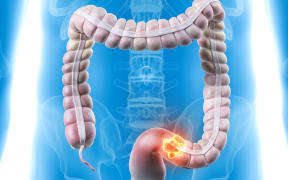A new study confirms a lower survival rate for cancer in New Zealand compared to Australia.

Samples of a colon biopsy ready to be sent to a laboratory. Photo: A. BENOIST / BSIP
Research by the University of Auckland, published this week in PLOS One, showed the chance of surviving cancer in Australia had improved by 6 percent for men and 3 percent for women.
In New Zealand, the improvement was less than 2 percent for both women and men.
The researchers estimated about 12 percent of New Zealand deaths from cancer within five years of diagnosis would be avoided if this country's survival rate was the same as Australia's.
There had been no significant increase in New Zealand's bowel cancer survival rate, and Bowel Cancer New Zealand spokesperson Mary Bradley said she was not surprised.
Australia has had a bowel cancer screening programme for 10 years and it was time New Zealand caught up, she said.
"We know that Kiwis are dying because of a lack of early diagnosis, which comes down to the lack of a national screening programme.
"We've been calling for a roll-out of screening since 2010 and yet we are no closer to a firm commitment and timeline from the government."
New Zealand was one of the few developed countries who did not have a national screening programme, Ms Bradley said.
Professor Mark Elwood from the University of Auckland said there needed to be more work done overall.
"We need to improve our efforts, particularly to improve early diagnosis starting in primary care, as well as optimum treatment, for New Zealand cancer patients to catch up with the progress in Australia.
"When we have data on more recently diagnosed patients, after 2010, we will be able to see whether these trends are continuing or have changed."
There were several studies looking at the years after diagnosis that showed New Zealand cancer patients had fewer good outcomes compared to Australia, he said.




